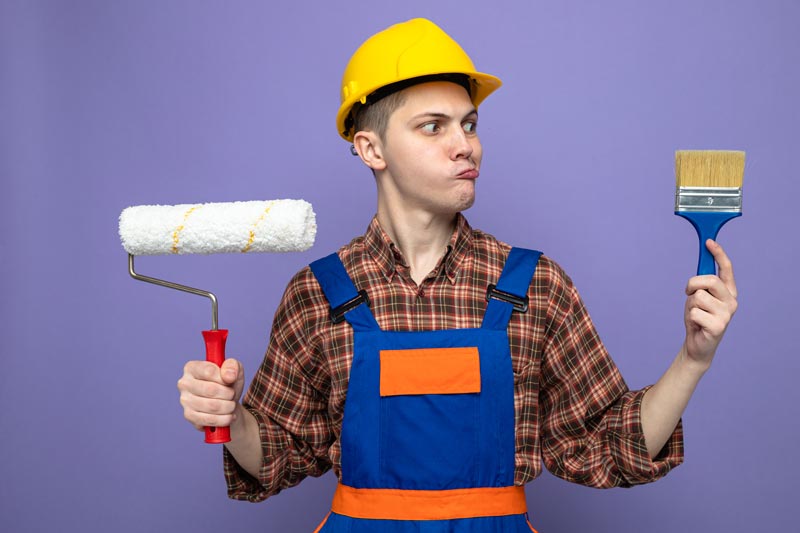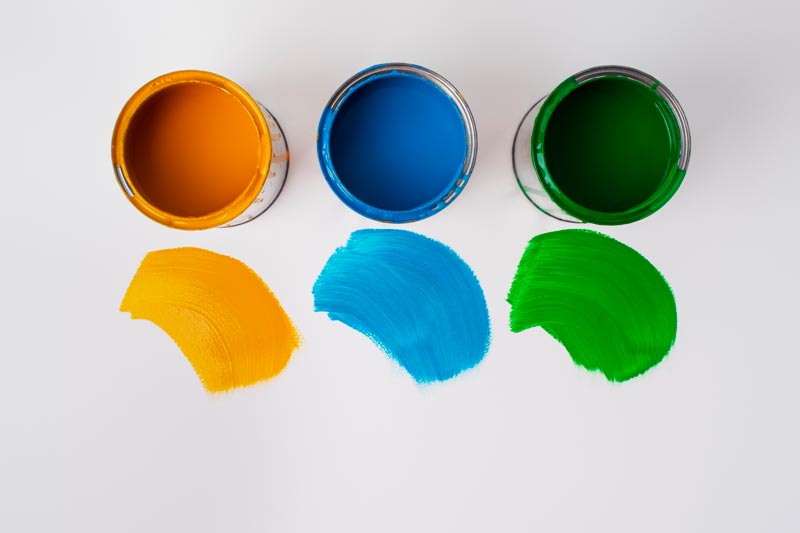Menu

When it comes to house painting in Trumbull, CT, it’s important to be aware of the potential dangers involved. Painting projects may seem straightforward, but there are certain hazards that homeowners and painters need to consider for their safety. This article will explore some of the common dangers to look out for when house painting in Trumbull, CT, and provide valuable tips to ensure a successful and safe painting experience.
Homes built before 1978 may contain layers of paint that contain lead, which can be harmful, especially when disturbed during the painting process. The toxicity of lead can cause developmental delays, learning disabilities, behavioral problems, organ damage, and other severe health complications.
Here’s how you can make your house painting in Trumbull, CT, safer in the presence of lead-based paint:
To test for the presence of lead-based paint in your home, you can use a lead testing kit. These kits are available at hardware stores and typically include swabs or solutions that change color when they come into contact with lead. Follow the instructions provided with the kit to collect samples from different areas of your home and perform the test.
When working with lead-based paint, it is crucial to wear the appropriate protective equipment. This includes a NIOSH-approved respirator to protect against inhaling lead dust or fumes. Disposable coveralls will help prevent the transfer of lead particles to your clothing, and gloves will protect your hands from direct contact with the paint. Safety goggles should be worn to shield your eyes from potential splashes or airborne particles.
Before starting house painting in Trumbull, CT, create a containment area to prevent the spread of lead dust. Cover floors and furniture with heavy-duty plastic sheets, and use tape to seal off the area. This will help contain any dust or debris generated during the painting process, reducing the risk of contamination in other parts of the house.
To minimize the generation of lead dust, use wet sanding and scraping techniques. Wetting the surface before sanding or scraping helps keep the dust from becoming airborne. Use a spray bottle filled with water to dampen the area you are working on. This will help to bind the dust and make it easier to clean up afterward. Remember to change the water frequently to ensure its effectiveness.
After completing your painting in Trumbull, CT, it is crucial to clean up the work area properly. Start by using a HEPA vacuum cleaner to remove any dust and debris from surfaces, floors, and furniture. Wipe down surfaces with a damp cloth to capture any remaining dust. Dispose of all waste materials, including paint chips and dust, in accordance with local regulations for hazardous waste. Contact your local waste management facility for guidance on the proper disposal methods.
If you are unsure about handling lead-based paint or have concerns about your safety, it is advisable to seek professional assistance. Certified lead abatement contractors have the necessary training and expertise to safely remove or encapsulate lead-based paint. They can assess the situation, provide guidance, and perform the necessary work to ensure a safe environment.
During your house painting in Trumbull, CT, paint solvents, thinners, and paint strippers are considered harmful chemicals because they can emit volatile organic compounds (VOCs) that can be inhaled, leading to respiratory irritation and other health issues. Additionally, these chemicals can cause skin and eye irritation upon direct contact, potentially resulting in dryness, redness, and dermatitis.
House painting in Trumbull, CT, inherently requires chemicals that may be toxic for you. But you can stay safer with the following tips:
Before using any chemical product, carefully read the labels and instructions provided by the manufacturer. Pay attention to any safety warnings, recommended ventilation requirements, and proper handling instructions.
Adequate ventilation is crucial when working with hazardous chemicals. Open windows and doors to promote airflow, and consider using fans or exhaust systems to help remove fumes from the work area. If possible, work outside or in an area with good ventilation.
Specific equipment for handling chemicals includes chemical-resistant gloves, a respirator or mask with proper filters, safety glasses or goggles, and protective clothing such as long-sleeved shirts, long pants, and a chemical-resistant apron or coveralls. These items provide a physical barrier to minimize direct contact with the chemicals and protect your skin, respiratory system, and eyes from potential harm.
When not in use, store chemicals in their original containers and keep them in a cool, dry place away from heat sources and direct sunlight. Ensure that containers are tightly sealed to prevent leaks or spills.
Follow local regulations for the proper disposal of hazardous chemicals. Avoid pouring them down the drain or throwing them in the trash. Contact your local waste management facility to inquire about hazardous waste disposal options in your area.
Choose a suitable storage area away from heat and ignition sources, use appropriate containers, label them clearly, separate incompatible chemicals, and keep them out of reach of children and pets. These practices ensure safe and organized storage, reducing the risks associated with chemical handling and maintaining a secure environment for house painting projects.
Stay informed about the potential hazards associated with the chemicals you are using. Understand the symptoms of chemical exposure and know what to do in case of an emergency. Familiarize yourself with safety data sheets (SDS) provided by the manufacturers, which contain detailed information about the chemicals and their potential risks.
Working at heights during house painting in Trumbull, CT, is dangerous due to the risk of falls. Falls from ladders, scaffolding, or other elevated surfaces can lead to severe injuries, including broken bones, head trauma, spinal cord injuries, and even death. The lack of proper safety precautions, unstable surfaces, improper ladder usage, and human error can increase the likelihood of accidents.

When house painting in Trumbull, CT, there are a couple of simple guidelines you can follow to prevent yourself from falling off great heights. Here are some of them:
To ensure your safety when house painting in Trumbull, CT, at heights, it’s crucial to follow proper ladder safety practices. Set up the ladder on a stable surface and ensure it is securely positioned. Maintain three points of contact with the ladder at all times, avoid overreaching, and never stand on the top rung or step.
Creating a clean and clutter-free work area is essential for preventing accidents and falls. Remove any obstacles, tools, or debris from the area where you will be working. Keep your work area organized, ensuring that your paint cans, brushes, and other materials are properly stored and not creating tripping hazards.
When house painting in Trumbull, CT, at heights, it’s important to wear the appropriate safety gear to protect yourself from potential injuries. This includes wearing a hard hat to protect your head, safety goggles to shield your eyes from dust or debris, and sturdy non-slip footwear to maintain grip and stability.
Using sturdy and stable equipment is crucial when house painting in Trumbull, CT, at great heights. Ensure that the ladders, scaffolding, or any other elevated platforms you use are in good condition and can support your weight. Check for any defects or damage before use and make sure they are properly set up on a level surface.
Electrical hazards refer to potential risks associated with electricity, which can pose serious dangers during house painting in Trumbull, CT. These hazards include exposed wiring, faulty electrical equipment, and improper handling of electrical connections. They are dangerous because contact with live electrical sources can result in electrical shock, burns, fires, and even fatal electrocution. It is essential to understand and address electrical hazards to ensure a safe working environment and prevent accidents or injuries.
When house painting in Trumbull, CT, near electrical hazards, keep these important guidelines in mind:
Before house painting in Trumbull, CT, near electrical hazards, it is crucial to turn off the power to the affected area. Locate the appropriate circuit breaker or switch in your electrical panel and switch it off to cut off the power supply. If you’re unsure which breaker or switch controls the specific area, it’s best to turn off the main power switch for the entire house. Remember to communicate with other occupants of the house to ensure everyone is aware of the power shutdown.
When inspecting for damaged wiring, look for signs such as frayed or exposed wires, cracked insulation, or loose connections. Check outlets, switches, and electrical panels for any abnormalities. Use a flashlight to get a clear view and avoid touching any exposed wires. If you notice any damaged wiring, it’s important to stop work and seek assistance from a qualified electrician to assess and repair the wiring safely.
Non-conductive tools are made from materials that do not conduct electricity, such as plastic or rubber. These tools are designed to minimize the risk of electric shock. When using non-conductive tools for house painting in Trumbull, CT, ensure that brushes, rollers, and other equipment are made from non-metallic materials. This helps prevent accidental contact with live electrical sources during the painting process. Always use these tools as recommended and avoid using damaged or compromised tools that may no longer provide proper insulation.
When working near electrical hazards, it is important to maintain a safe distance to minimize the risk of electrical shock or accidents. As a general guideline, stay at least 10 feet away from power lines or any exposed electrical sources. This distance can vary depending on the voltage and specific circumstances, so it’s best to consult with a professional electrician or adhere to local safety regulations for precise guidelines.
To further protect yourself from electrical hazards, it is advisable to wear insulated equipment when working near electrical sources. Insulated gloves, footwear, and tools are specifically designed to provide an extra layer of protection against electric shock. When using insulated equipment, ensure they are in good condition and free from any damage that could compromise their insulation properties. It’s also important to follow the manufacturer’s instructions on how to properly use and maintain the insulated equipment.
Moisture or the presence of water can significantly increase the risk of electrical accidents and electric shock. Water is a conductor of electricity, and when it comes into contact with live electrical sources, it can create a dangerous situation. If you notice moisture or the presence of water near electrical equipment or wiring while house painting in Trumbull, CT, it is crucial to stop working immediately and ensure the area is dry before continuing. Ignoring the presence of moisture or water can lead to severe electrical hazards and jeopardize your safety.
Molds and mildews are types of fungi that thrive in moist environments. They can appear as black, green, or brown patches on surfaces and pose several dangers. When you’re house painting in Trumbull, CT, mold and mildew can cause health risks, such as respiratory issues and allergic reactions, weaken the structural integrity of buildings, diminish the aesthetic value of surfaces, and emit unpleasant odors.
When house painting in Trumbull, CT, in the presence of mold and mildew, keep yourself safe with the following tips:
When house painting in Trumbull, CT, it is recommended to use paint products that contain mold and mildew inhibitors. These inhibitors are specially formulated to prevent the growth of mold and mildew on painted surfaces. Follow the manufacturer’s instructions for application, ensuring thorough coverage of the affected areas. This can help inhibit the growth of mold and mildew and provide long-term protection for your painted surfaces.
To prevent the growth of mold and mildew, it is essential to address any underlying moisture issues in your home. Inspect for leaks, water seepage, or high humidity levels that could contribute to moisture accumulation. Repair any leaks, improve drainage systems, and consider using dehumidifiers or ventilation solutions to regulate moisture levels in the affected areas. By eliminating excess moisture, you can reduce the favorable conditions for mold and mildew growth.
Proper ventilation is crucial in preventing mold and mildew growth. During your house painting in Trumbull, CT, open windows and doors to promote air circulation. You can also use fans or dehumidifiers to help dry out the area and reduce humidity levels. After house painting in Trumbull, CT, continue to maintain good ventilation in the painted spaces to prevent the buildup of moisture and minimize the risk of mold and mildew growth.
When dealing with mold and mildew, it is important to prioritize your safety. Wear respiratory protection, such as N95 masks, to prevent inhaling mold spores. These masks are designed to filter out airborne particles and provide a barrier against harmful substances. Ensure the mask fits snugly over your nose and mouth, and follow the manufacturer’s instructions for proper usage and disposal. Remember to replace the mask regularly to maintain its effectiveness.

The weather in Trumbull, CT, can be unpredictable, with temperature fluctuations, high humidity, and occasional storms. These weather conditions can affect the drying and adhesion of paint, leading to unfavorable results and premature paint failure. Weather conditions can be dangerous to you as a painter because extreme temperatures, high humidity, and storms can pose risks such as heat exhaustion, dehydration, slippery surfaces, and the potential for accidents due to unstable working conditions.
If the weather is bearable for house painting in Trumbull, CT, here are ways you can paint your home safely:
Before house painting in Trumbull, CT, check the weather forecast to ensure that there are no severe weather conditions expected during the day. Avoid painting during extreme temperatures, heavy rain, or strong winds.
Schedule your house painting in Trumbull, CT, during periods of the day when the weather is more favorable. For example, consider painting early in the morning or late in the afternoon when temperatures are milder and the sun is less intense.
Ensure that the surface to be painted is clean, dry, and free from any moisture. Proper surface preparation will help the paint adhere better and prevent issues caused by moisture or humidity.
Select high-quality paint products that are designed to withstand the local weather conditions in Trumbull, CT. Consider using exterior paints that offer resistance to fading, cracking, and peeling, especially in areas prone to extreme weather.
Wear appropriate protective gear such as gloves, goggles, and a respirator to protect yourself from any potential hazards. Use proper ladder safety techniques and secure your equipment to prevent accidents caused by slippery surfaces or strong winds.
Stay alert and continuously monitor the weather conditions while house painting in Trumbull, CT. If the weather suddenly worsens, including the onset of heavy rain, lightning, or strong winds, stop the painting process immediately and secure your equipment.
Don’t take on the daunting task yourself. Leave it to the professionals at Trumbull House Painter Pros, your trusted local painting experts. Our painters are trained professionals who take pride in their work. We pay attention to every detail, ensuring precise and flawless results that will enhance the beauty of your home.
At Trumbull House Painter Pros, we value our customers. We strive to provide outstanding customer service, addressing any concerns or questions you may have throughout the painting process. Give your home a fresh, new look with the help of Trumbull House Painter Pros. Contact us today for a free quote!